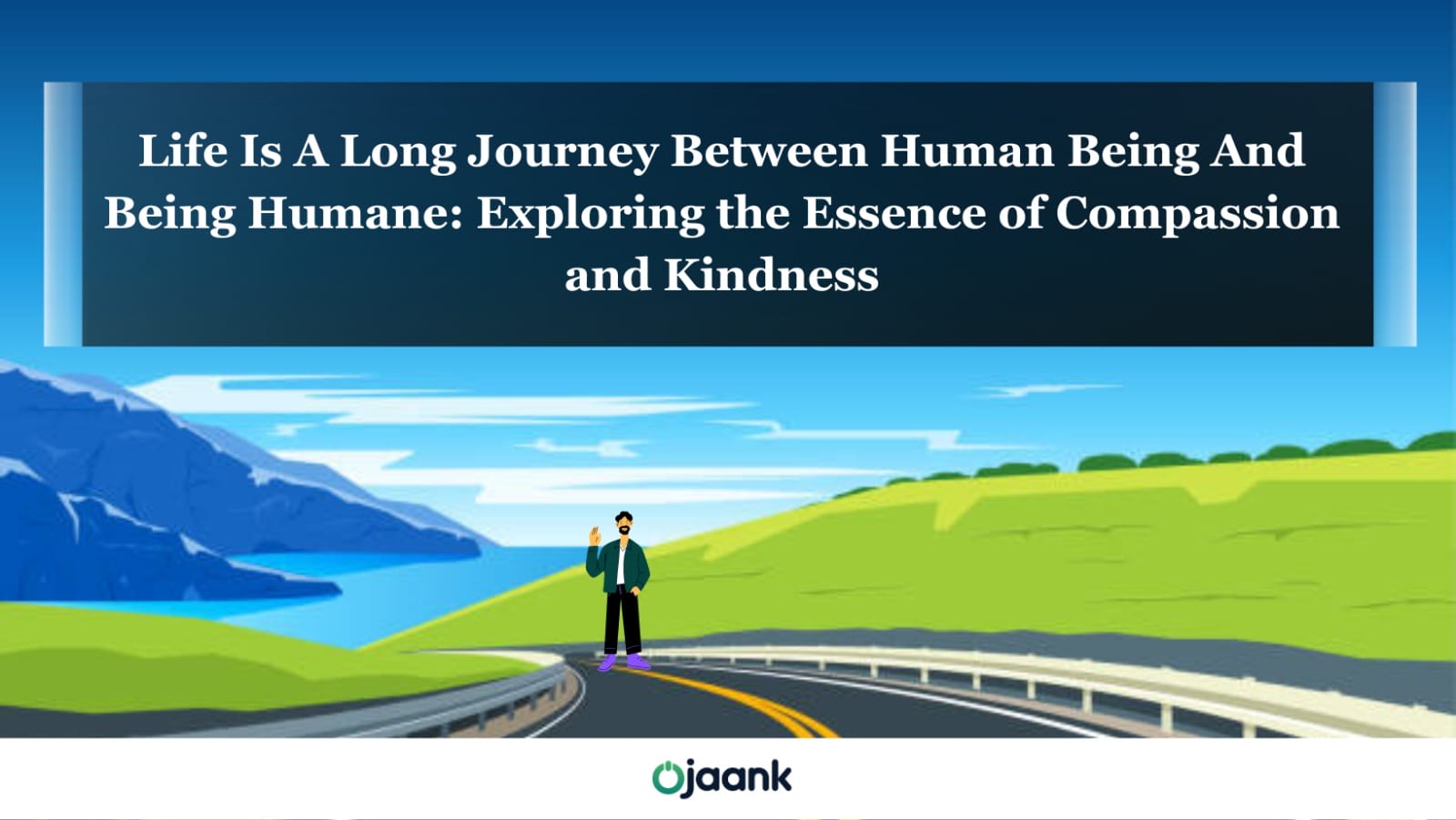Life Is A Long Journey Between Human Being And Being Humane: Exploring the Essence of Compassion and Kindness

In the tapestry of existence, the journey of life traverses a multitude of experiences, emotions, and interactions. Central to this journey is the intricate relationship between human beings and their capacity to be humane – to exhibit compassion, empathy, and kindness towards one another. This profound aspect of humanity is often overlooked in the hustle and bustle of daily life, yet its significance cannot be overstated. Drawing from real-life examples in the Indian context, we delve into the notion that life is indeed a long journey between merely existing as human beings and truly embodying the essence of being humane.
Compassion, a cornerstone of being humane, manifests as the ability to empathize and alleviate the suffering of others. The story of Narayanan Krishnan, a chef from India, exemplifies the transformative power of compassion. In 2002, Krishnan encountered an elderly homeless man eating his own waste due to hunger. This heart-wrenching sight ignited a fire within Krishnan, prompting him to abandon his career and establish the Akshaya Trust, an organization dedicated to feeding the homeless and mentally ill in Madurai. Krishnan's journey showcases the transition from being a mere human to being profoundly humane, as he recognized his privilege and used it to uplift those less fortunate.
Empathy serves as the bridge connecting human beings to being humane. It enables individuals to understand the emotions and perspectives of others, fostering a sense of shared humanity. The narrative of Dr. Devi Shetty, a renowned cardiac surgeon in India, underscores this connection. Dr. Shetty founded Narayana Health, a chain of hospitals that provides affordable healthcare to thousands. His motivation emanated from witnessing the financial struggles of patients, particularly those from underprivileged backgrounds. By embracing empathy, Dr. Shetty transcended the realm of his medical expertise and embraced the role of a compassionate healer, emphasizing that true fulfillment comes from being humane.
Acts of kindness have an astonishing ripple effect, capable of transforming not only individuals but entire communities. The "Wall of Kindness" movement in India beautifully exemplifies this phenomenon. Originating in the city of Pune, these walls invite people to donate clothing and essentials for the needy. The movement swiftly spread across the nation, fostering a sense of unity and empathy. These walls symbolize the transition from being isolated human beings to being interconnected and kind-hearted individuals, redefining the dynamics of society.
Being humane transcends social and economic divides, creating a harmonious coexistence. The Sulabh International organization, led by Dr. Bindeshwar Pathak, illustrates this idea remarkably. Through innovative sanitation solutions, Sulabh has liberated thousands of manual scavengers from their degrading profession, offering them opportunities for education and employment. Dr. Pathak's dedication demonstrates that the journey towards being humane requires dismantling deeply entrenched societal injustices and inequalities.
Education plays a pivotal role in shaping individuals into compassionate beings. The "Khan Academy," founded by educator Salman Khan, is a testament to this principle. By providing free, high-quality education online, Khan Academy addresses educational disparities, thereby fostering empathy and leveling the playing field. Khan's endeavor underscores that the journey towards being humane necessitates equipping individuals with the tools to understand and alleviate the challenges faced by others.
Volunteerism stands as a concrete manifestation of being humane, as it involves selflessly dedicating time and effort to uplift others. The example of "Robin Hood Army," a volunteer-based organization, illustrates this concept vividly. Comprising volunteers from all walks of life, the organization collects surplus food and distributes it to the hungry. The volunteers' commitment transcends their individual identities, showcasing the transformation from being ordinary human beings to being extraordinary agents of change through their kindness and solidarity.
Crises often bring out the best in humanity, revealing the inherent potential for compassion even in dire circumstances. The COVID-19 pandemic underscored this truth globally, and India's response was no exception. From individuals providing food to stranded migrants to organizations setting up makeshift hospitals, the nation demonstrated a collective spirit of empathy and solidarity. This crisis accentuated that the journey towards being humane is often intensified during times of adversity.
In the grand tapestry of life, the journey between human beings and being humane is both profound and transformative. The Indian landscape is adorned with countless instances where individuals and organizations have transcended their roles as mere humans to embody the essence of compassion, empathy, and kindness. Whether it is through acts of kindness, acts of volunteerism, or acts of compassion, the transition towards being humane bridges the gaps that divide us and enriches our shared human experience. As we traverse this long journey of life, let us strive to cultivate our capacity to be truly humane, thereby adding depth, meaning, and warmth to our existence.